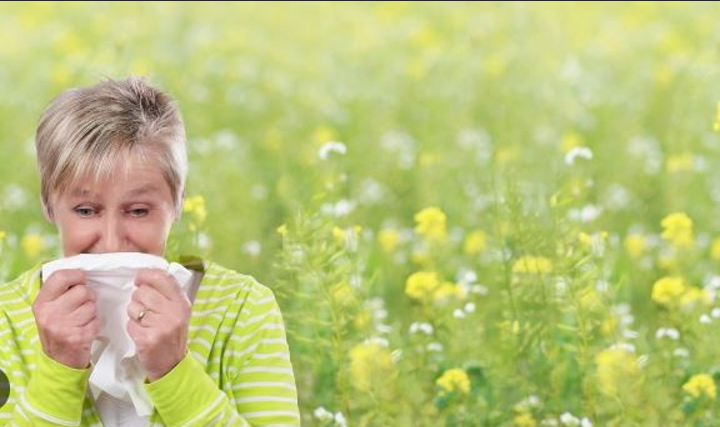Updates
Herbs for Seasonal Allergy Relief: Explore Nature’s Antihistamines
As the warm embrace of summer arrives, so do seasonal allergies for many individuals. The blooming flowers and lush greenery can trigger a cascade of unpleasant symptoms, including sneezing, itchy eyes, and nasal congestion. While over-the-counter medications are readily available, a growing number of people are seeking natural alternatives to find relief from these seasonal allergy woes. In this comprehensive article, we will delve deeper into the world of herbs known for their potent anti- inflammatory and antihistamine properties, such as nettle, butterbur, and elderflower.
Join us on this journey to discover how these remarkable herbs can alleviate common summer allergy symptoms and offer respite from nature’s seasonal challenges.
Nettle (Urtica dioica): A Natural Antihistamine Wonder
Nettle, scientifically known as Urtica dioica, has a long-standing history of use in traditional medicine to address a variety of health concerns, including allergies. This remarkable herb contains bioactive compounds that exhibit natural antihistamine properties, effectively reducing the body’s release of histamine, which is responsible for triggering many allergy symptoms. Moreover, nettle possesses impressive anti- inflammatory properties that can help alleviate nasal congestion and soothe irritated mucous membranes. The versatility of nettle allows it to be consumed as a nourishing tea or taken in the form of supplements, providing a natural and holistic approach to allergy relief.
Butterbur (Petasites hybridus): A Promising Natural Remedy
Another herb gaining recognition for its potential in alleviating seasonal allergies is butterbur, derived from the Petasites hybridus plant. The active ingredients found in butterbur, known as petasins, demonstrate notable antihistamine and anti-inflammatory properties. Clinical studies have shown promising results, suggesting that butterbur may be as effective as certain over-the-counter antihistamine medications in reducing allergy symptoms. However, it is important to note that raw butterbur contains substances that can be toxic to the liver. To ensure safety, processed forms of butterbur, which have had these harmful compounds removed, should be utilized.
Elderflower (Sambucus): Harnessing Nature’s Immune Support
Elderflower, derived from the elder plant (Sambucus), has a rich history in traditional medicine, where it has been utilized for its diverse range of health benefits. This remarkable herb boasts antihistamine and anti-inflammatory properties that make it a valuable natural remedy for allergy sufferers. By inhibiting the release of histamine, elderflower can effectively reduce nasal congestion, sneezing, and itching associated with seasonal allergies. Furthermore, elderflower has been suggested to support the immune system, potentially reducing the duration and severity of allergy symptoms. This versatile herb can be consumed as a soothing tea, incorporated into recipes, or conveniently taken in the form of dietary supplements.
While the potential benefits of these herbs in relieving seasonal allergies are compelling, it is imperative to consult with a healthcare professional before incorporating them into your daily routine. Their expertise will provide valuable guidance, ensuring compatibility with any existing medications or health conditions, and determining appropriate dosages to maximize safety and effectiveness.
Preventative Measures
In addition to exploring the potential of herbal remedies, it is essential to implement other preventive measures to effectively manage seasonal allergies. These include minimizing exposure to allergens by keeping windows closed during high pollen counts, utilizing air purifiers indoors, and reducing outdoor activities during peak pollen times.
Maintaining a clean living environment by regularly removing allergens like dust mites, pet dander, and mold can significantly alleviate allergy symptoms. Practicing good hygiene, such as frequent handwashing to prevent pollen transfer, is equally important.
Support Overall Health
Additionally, supporting overall health through a balanced diet, regular exercise, and adequate rest can strengthen the immune system and reduce the severity of allergy symptoms.
Taking a holistic approach to managing seasonal allergies involves incorporating healthy habits into your lifestyle. By adopting a nutrient-rich diet, you can provide your body with the necessary vitamins and minerals to support immune function and reduce inflammation. Fresh fruits and vegetables, particularly those rich in antioxidants, can provide a natural defense against allergic reactions. Foods like citrus fruits, leafy greens, and berries are known for their immune-boosting properties.
Regular physical activity can also play a significant role in managing seasonal allergies. Exercise helps improve circulation, promotes a healthy respiratory system, and boosts overall immunity. Engaging in activities like brisk walking, cycling, or swimming can alleviate allergy symptoms and enhance your well-being.
Stress management is another vital aspect of allergy relief. Chronic stress can weaken the immune system and exacerbate allergy symptoms. Incorporating stress-reducing techniques such as meditation, yoga, deep breathing exercises, or spending time in nature can help calm the body’s response to allergens.
In addition to these lifestyle modifications, natural remedies can provide additional support for allergy relief. Some individuals find relief from symptoms by using saline nasal rinses to cleanse the nasal passages and reduce congestion. Nasal irrigation can flush out irritants and allergens, providing temporary relief from stuffiness and promoting clearer breathing.
Quercetin, a natural compound found in foods like onions, apples, and berries, has been shown to possess anti-allergic properties. Incorporating quercetin-rich foods into your diet or taking quercetin supplements may help alleviate allergy symptoms by reducing histamine release and inflammation.
Local honey is another popular natural remedy for seasonal allergies. Consuming raw, unfiltered honey sourced from your region may expose you to small amounts of local pollen, potentially helping your body develop tolerance over time. However, scientific evidence supporting this theory is limited, and individuals with severe allergies should exercise caution when trying this approach.
It’s important to remember that natural remedies may not provide immediate relief for everyone. Allergy symptoms vary from person to person, and individual responses to herbal remedies can differ. Consulting with a healthcare professional who understands your medical history and allergies is crucial to determine the most suitable approach for your specific needs.
In conclusion, herbs such as nettle, butterbur, and elderflower offer natural alternatives for seasonal allergy relief. Their anti-inflammatory and antihistamine properties make them valuable allies in reducing allergy symptoms such as sneezing, itching, and nasal congestion. However, it’s essential to consult with a healthcare professional before incorporating these herbs into your routine, ensuring their compatibility and safety. By combining herbal remedies, lifestyle adjustments, and preventive measures, you can find relief from seasonal allergies and enjoy the beauty of summer to the fullest.


















